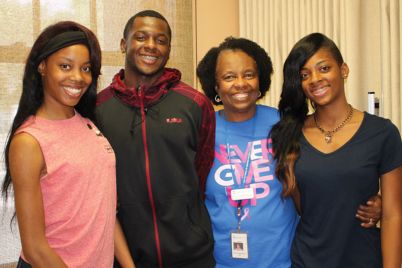BY J.A. JONES, Staff Writer
STATEWIDE — Advances in technology and treatment have greatly changed the landscape for people living with HIV/AIDS – the human immunodeficiency virus infection and acquired immune deficiency syndrome.
Once a serious death threat, today’s treatment for HIV, called antiretroviral therapy (ART), allows people with HIV/AIDS to lead healthy and productive lives that can extend into and beyond their 90s, according to the online HIV advocacy journal “POZ.”
In fact, the oldest known person in treatment and living with HIV, who was known as Miguel, “the Lisbon Patient,” passed in 2019 at the ripe age of 100.
Though ART doesn’t cure AIDS, daily administration of the combined HIV medicines – called an HIV treatment regimen – will reduce the quantity of virus in a given volume of body fluid, referred to as the viral load.
The treatment’s goal is to get the viral load to an undetectable level. When a person’s antiretroviral HIV medication has suppressed that person’s viral load to “undetectable,” it means the level of HIV in the blood is too low to detect, rendering them physically unable to transmit HIV to a sexual partner.
Following the lead of several hundred international groups, the Centers for Disease Control and Prevention have endorsed the scientific evidence showing that when an individual has an undetectable HIV viral count, there is effectively no risk of transmitting HIV to a sexual partner.
The Prevention Access Campaign launched the message that “U=U” or “undetectable equals untransmittable” to help reduce the stigma that people living with HIV face.
This is very good news. The very bad news? According to Equality Florida (EF), Florida’s outdated and antiquated HIV criminalization laws are hindering people from learning their status, and if necessary, starting treatment early enough to prevent virus-linked physical damage or prevent becoming full-blown AIDS.
EF is the largest civil rights organization dedicated to securing full equality for Florida’s lesbian, gay, bisexual, transgender and queer (LGBTQ) community. For nearly 25 years, EF has engaged in lobbying, coalition-building, grassroots organizing, and education to combat harassment or discrimination based on sexual orientation, gender identity, or expression.
Through their work, EF has been able to defeat anti-LGBTQ legislation, including efforts to prohibit domestic partnership benefits and protections and end all the safe school policies that impact LGBTQ youth in Florida.
Still, according to EF, there is much work to be done to protect people living with HIV from discriminatory Florida legislation. Their fact sheet on “HIV Modernization” notes:
- In Florida, a person can be sentenced to up to 30 years in prison for failing to prove disclosure of their HIV status — regardless of whether HIV transmission occurs or medically possible.
- Although it has been federally legal since 2013, people living with HIV in Florida are banned from donating blood, tissue, and organs — even to others living with HIV.
- Florida’s HIV laws were written at the height of the HIV/AIDS epidemic and haven’t been updated to reflect current science in treatment and prevention.
“For the last three-plus years, we’ve launched a specific HIV advocacy program that is really centered on reducing HIV stigma and modernizing Florida’s HIV criminalization laws,” shared EF’s Public Policy Director Jon Harris Maurer. EF is on the Florida HIV Justice Coalition steering committee, made up of advocacy organizations and organizations led by people living with HIV and focused on updating these laws.
Maurer pointed specifically to the laws dealing with non-disclosure status, as well as laws prohibiting organ donation.
“Right now, it is a third-degree felony in Florida for somebody living with HIV, who knows their status, to donate blood tissue or organs to another person,” Maurer noted. However, there are already provisions for informed consent, and as Maurer affirmed, “no doctor is going to be performing organ transplants without that sort of consent.”
But it’s the criminalization of people living with HIV who attempt to donate blood tissue and organs that EF is fighting.
“The kind of reform that we’re talking about would only open up what they call POS-to-POS donations, so donations from one person with HIV to another person living with HIV, and those are critical.”
Maurer added that since people living with HIV now have basically the same life expectancy as those without, it also means the need for organ transplants is even greater – and people living with HIV and in treatment could, and would, only be donating to other people living with the virus. This would increase the odds of people in both groups — non-positive HIV and positive HIV — needing transplants to be able to get them.
But right now, the state is barring these possibly life-saving organ donations by attaching a third-degree felony to the act.
The other main issue the Florida HIV Justice Coalition is fighting is that currently, a person living with HIV can be sentenced to 30 years in prison if a sexual partner claims that person failed to disclose their HIV status. The law does not consider any prevention methods, malicious intent, or whether HIV transmission was medically possible or actually occurred.
“I think most important is that Florida’s current HIV laws work against public health because they discourage people from knowing their status and getting into treatment,” Maurer stated. “All those laws are premised on knowing your status. So, if you don’t know your status, then you can’t be liable. And that’s obviously a perverse incentive of these laws as they’re currently written.”
In other words, current legislation encourages remaining untested and unaware of one’s status, which contributes to negative health outcomes in the long run. And of course, with HIV on the rise throughout Florida – especially in Black and Brown communities — any legislation resulting in stigmatization of those living with HIV must change to improve health outcomes and decrease the number of new HIV cases.
For more information on Equality Florida’s work on HIV, visit eqfl.org/HIV_Advocacy.








